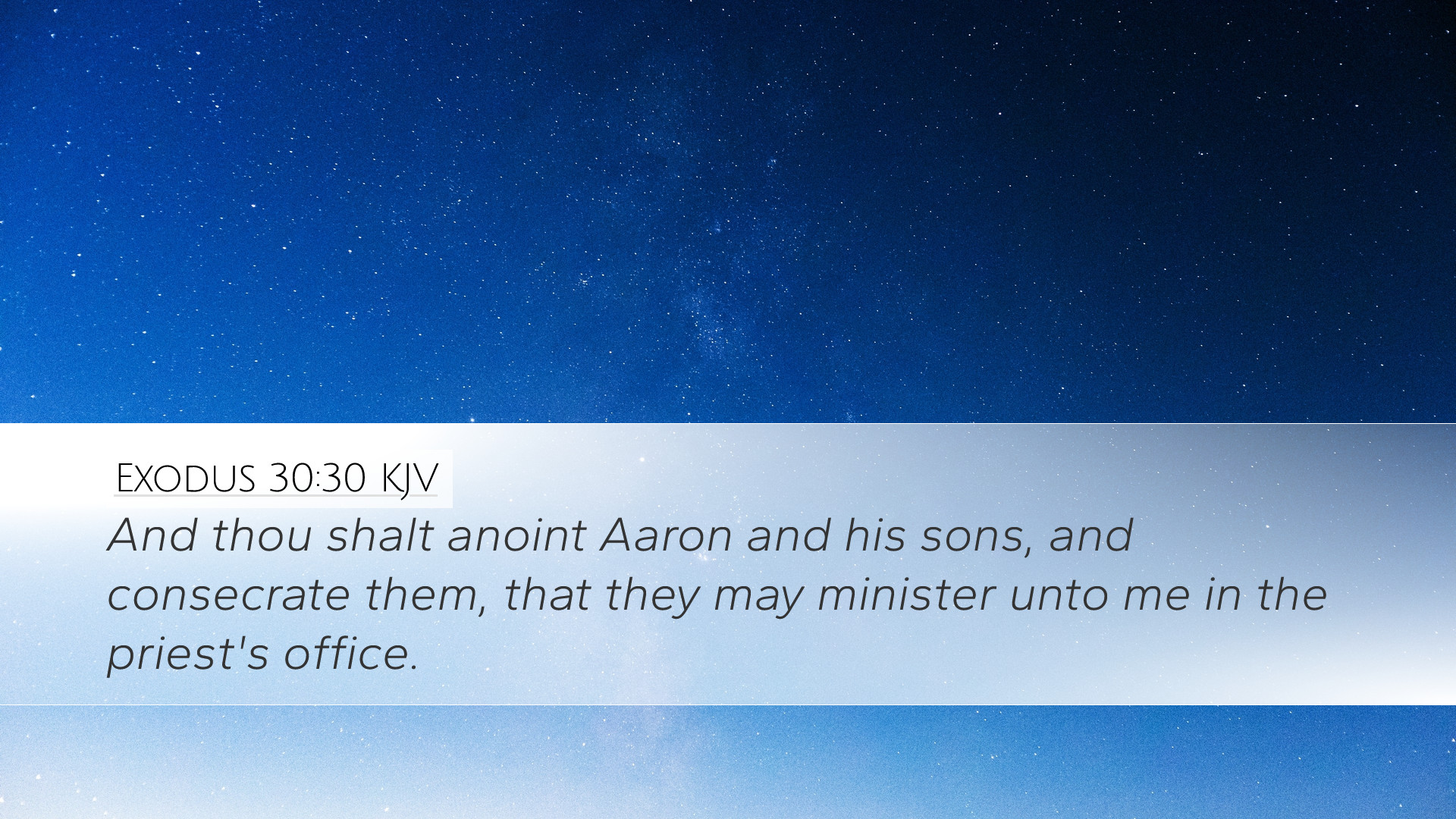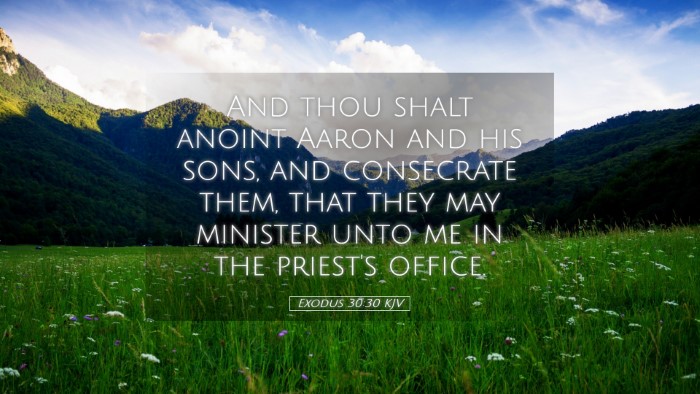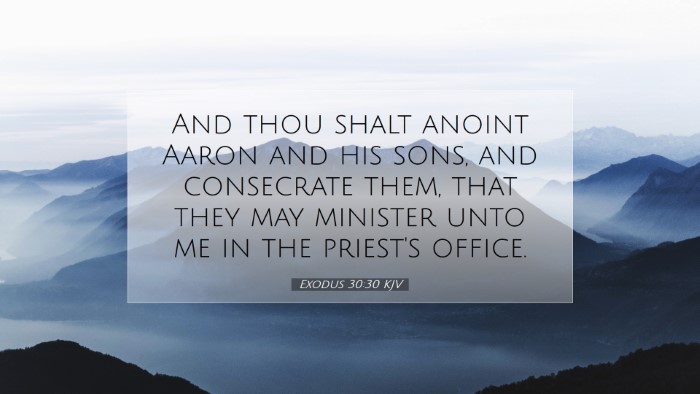Commentary on Exodus 30:30
Verse: "And thou shalt anoint Aaron and his sons, and consecrate them, that they may minister unto me in the priest's office." (Exodus 30:30)
This verse is a pivotal moment in the establishment of the Levitical priesthood, and its implications resonate deeply within biblical theology. A synthesis of insights from public domain commentaries provides a thorough understanding of its significance.
Contextual Background
Exodus 30 forms part of the instructions given to Moses on Mount Sinai concerning the tabernacle and its furnishings. The anointing of Aaron and his sons is not merely a ceremonial act but is essential for their consecration and suitability for sacred service.
Matthew Henry's Commentary
Matthew Henry emphasizes the importance of the anointing oil, which symbolizes the presence of God and His blessing. According to Henry, the anointing indicates not only the setting apart of the priests for holy duties but also foreshadows the ministry of Christ as the ultimate High Priest.
Key Insights from Henry:
- The Nature of Anointing: Anointing conferred authority and legitimacy upon Aaron and his sons. It was a divinely ordained process highlighting their role as mediators between God and the people.
- Consecration Significance: The act of consecration was necessary for spiritual efficacy. The priests needed to be set apart, illustrating the holiness required for coming before God.
- Typological Implications: Henry connects this event to the New Testament, where the anointing of Jesus is seen as fulfilling the role of the anointed one, the Messiah.
Albert Barnes' Commentary
Albert Barnes provides additional insight into the practical aspects of the ritual. He points out that this was a unique anointing, distinct from any secular or ordinary activities, underscoring its sacred purpose.
Key Insights from Barnes:
- Anointing Oil: Barnes elaborates on the composition of the holy anointing oil, as previously prescribed in the text, symbolizing the unique nature of the calling of the priests.
- Ministerial Duties: The emphasis on "minister unto me" reflects the personal relationship God desires with His people, and the mediating role of the priests serves as a bridge to that relationship.
- Symbolism of Holiness: The process of anointing provided a visible sign of God's choice, setting apart Aaron and his sons from the common populace for a particular work.
Adam Clarke's Commentary
Adam Clarke approaches this verse with a focus on the deeper spiritual meanings behind the physical actions. He reflects on the implications of consecration and the holistic transformation it entails.
Key Insights from Clarke:
- Spiritual Transformation: Clarke views the anointing as indicative of the Holy Spirit's work and a metaphor for divine empowerment necessary for effective ministry.
- Model for Leadership: He suggests that this act sets a precedent for how leaders within the faith community must be chosen and empowered by divine means.
- Community Perspective: Clarke highlights how this act was not only for Aaron and his sons but for the entire community, who were to be impacted by the faithfulness of their leaders.
Theological Significance
Any discussion on Exodus 30:30 must address the broader theological themes it invokes. The anointing serves as a reminder of God's election and empowerment of people for service, a theme strong throughout Scripture.
Holiness and Separation
The concept of divine holiness is paramount here. The anointing of Aaron and his sons illustrates how God's holiness requires a response of separation; those who serve Him must be distinguished from the ordinary.
Foreshadowing Christ
This rite of anointing foreshadows the Messianic role filled by Jesus Christ. He is the fulfillment of what the Levitical priesthood imperfectly represented.
Leadership Role of the Priesthood
The priestly role is fundamentally about serving others and mediating God’s grace. This ministry foreshadows the pastoral leadership today, emphasizing the continuity of divine calling across covenants.
Application for Today
For contemporary readers, particularly for pastors, theologians, and students, Exodus 30:30 offers profound insights into the nature of spiritual leadership and divine empowerment.
- Pastoral Ministry: Modern-day pastors are reminded of the importance of being consecrated and set apart for the service of God and His people.
- Dependency on God: This passage highlights the necessity of being anointed and empowered by the Holy Spirit for effective ministry.
- Shared Responsibility: Just as Aaron and his sons were responsible for the spiritual well-being of Israel, so are church leaders today called to shepherd their communities faithfully.
In summary, Exodus 30:30 encapsulates a vital moment in Israel's history, serving as a touchstone for understanding the nature of divine calling, consecration, and the role of spiritual leadership, stretching beyond ceremonial practices into the realm of personal and communal spiritual dynamics that remain relevant today.


